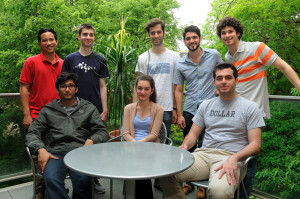
The Mack Institute is proud to announce that the University of Pennsylvania’s iGEM team will be advancing to the World Championships after winning the regional championship earlier this month. In this guest post, Josh Tycko and Danielle Fields describe their team’s accomplishments and express their gratitude for the Mack Institute’s support as a co-sponsor of the 2013 team.
iGEM is the premiere Synthetic Biology research competition wherein students are asked to discover new ways that biotechnology can improve society. This is a unique research opportunity in terms of the sheer amount of freedom undergraduates are given. Usually, we’re lucky to get the chance to design our own experiments. As iGEM team members, we get to start at the beginning of the scientific process – deciding what problem we want to tackle – and follow it through to the end.
This summer, our team of five undergrads worked full-time in the lab developing a novel method of regulating gene expression through targeted epigenetic modifications, a foundational advance in the field. Essentially, we created a biological toolbox to suppress genes in bacteria without changing the DNA sequence. We chose this project after reading stacks of journal articles and brainstorming dozens of ideas. (For some reason, the bacterial toothpaste and genetically-engineered compost ideas didn’t make the cut.) Over the next few months, we spent hours performing experiments, analyzing data, making adjustments, and repeating.
iGEM is all about teamwork, and everyone brings different backgrounds and strengths to the table. (It also helped to have four shoulders to cry on when we couldn’t get anything to work at the beginning of the summer.) With the guidance of our brilliant advisors, hours of dedication, and a little bit of caffeine, we developed our skills and progressed toward our goal. By August, the lab was running like a well-oiled machine and we finally produced the results we wanted: we were able to make targeted chemical changes in the bacterial genome and confirm the precision of these changes.
At the beginning of October, we presented our work before a panel of scientific judges at the regional competition in Toronto. Competing against 64 leading universities such as MIT, Stanford, and Yale, we ended up winning first place in North America! This is the second consecutive year that Penn has won the regional iGEM competition and advanced to the World Championships at MIT, a testament to the hard-working and scientifically creative culture of our group, and our extremely supportive sponsors and advisors. The Mack Institute has been hugely supportive since the early days of iGEM, and we would like to say thank you!
Josh Tycko and Danielle Fields



